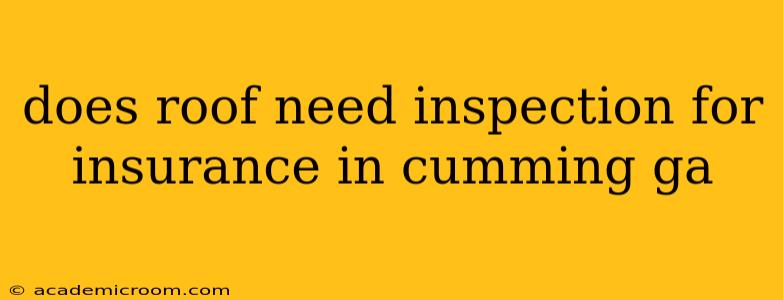Homeowners in Cumming, GA, often wonder if a roof inspection is required by their insurance company. The short answer is: it depends. While not always mandatory for initial policy issuance, a roof inspection can significantly impact your insurance coverage and premiums, especially concerning claims. Let's delve deeper into the specifics.
When Does My Insurance Company Require a Roof Inspection in Cumming, GA?
Several situations may trigger the need for a roof inspection from your insurance provider in Cumming:
-
Filing a Claim: If you file a claim for roof damage due to a storm, accident, or general wear and tear, a roof inspection is almost certainly required. The insurance adjuster will need to assess the extent of the damage to determine the payout. They'll verify the damage, assess the age and condition of your roof, and determine the cause of the damage to assess liability. A pre-existing condition might impact your claim's outcome.
-
Renewing Your Policy: While not always routine, some insurance companies in Cumming, GA, may request a roof inspection when your policy renews, particularly if your roof is nearing the end of its lifespan. This is a proactive measure to assess risk and accurately price your premiums.
-
High-Risk Areas: Cumming, GA, like many areas, is susceptible to severe weather, including hailstorms and strong winds. If your home is in a high-risk zone, your insurance provider might require a more frequent inspection to monitor your roof's condition.
-
Specific Policy Requirements: Finally, review your insurance policy documents carefully. Certain policies may explicitly state the need for periodic roof inspections. Don't hesitate to contact your insurance provider directly to clarify any ambiguities.
What Happens During a Roof Inspection for Insurance Purposes?
A roof inspection for insurance purposes typically involves a visual examination of your roof’s exterior. The inspector will check for:
- Missing or damaged shingles: This is a primary indicator of potential problems.
- Signs of water damage: Stains, discoloration, or areas of significant moss growth can suggest leaks.
- Overall structural integrity: The inspector will check for sagging, buckling, or other signs of structural compromise.
- Flashing condition: Proper flashing around chimneys, vents, and other penetrations is crucial to preventing leaks.
- Gutter and downspout condition: Proper water drainage is essential for roof longevity.
The inspector may use binoculars or even drones to get a closer look at hard-to-reach areas. They will compile a detailed report outlining their findings, which your insurance company will use to evaluate your risk and coverage.
How Often Should I Get My Roof Inspected?
Regardless of insurance requirements, it's wise to have your roof professionally inspected every 3-5 years, or more frequently if you live in a high-risk area. Regular inspections can help you identify minor issues before they escalate into costly repairs. This proactive approach can save you money in the long run and ensure the longevity of your roof.
What if My Roof Fails Inspection?
A failed inspection doesn't automatically mean you'll lose your insurance coverage. However, it might result in higher premiums or a requirement to make repairs before your policy is renewed or a claim is approved. Addressing the issues promptly shows your insurance provider you're taking proactive steps to maintain your property.
Finding a Qualified Roofing Inspector in Cumming, GA
Choosing a reputable roofing inspector is critical. Look for a certified inspector with experience working with insurance companies. Ask for references and check online reviews to ensure you're working with a qualified professional. A thorough inspection provides accurate information to both you and your insurer.
By understanding the intricacies of roof inspections and their connection to your insurance coverage in Cumming, GA, you can protect your home and your financial interests. Remember, proactive maintenance and regular inspections are essential to ensuring your roof remains in top condition and your insurance coverage remains intact.
